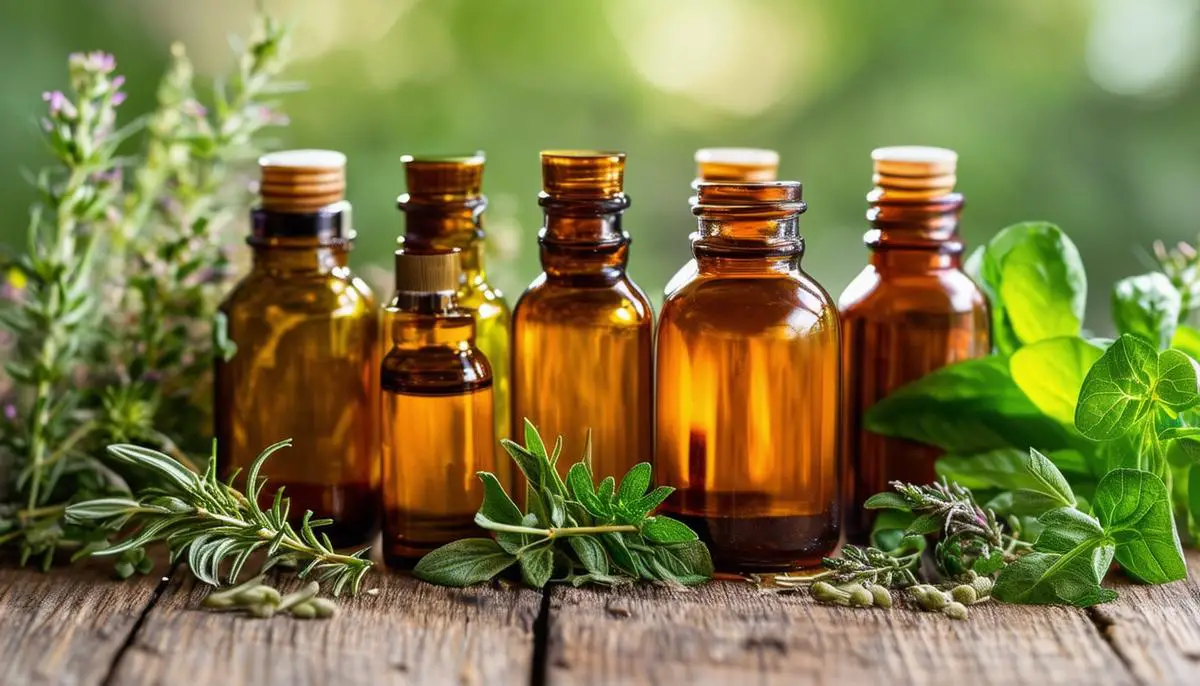
What Are Herbal Tinctures?
Herbal tinctures are potent liquid extracts made by soaking plant parts in a solvent like alcohol or vinegar. This method pulls out the essential compounds, giving you a concentrated form of the herb's active ingredients.
The process starts by gathering parts of the plant — leaves, roots, bark, or berries. Once you have the plant material ready, you wash it thoroughly and chop it coarsely. Place those pieces into an airtight jar and add your chosen solvent. For fresh herbs, a 1:1 plant-to-alcohol ratio works best. If you're using dried herbs, aim for a 1:4 ratio. The alcohol concentration often depends on the plant's water-soluble constituents. Herbs with more water-soluble components typically require 80-100 proof alcohol, while those with fewer need 180-proof.
Once sealed, the jar should sit for about six to eight weeks, shaken occasionally. After the waiting period, strain the plant material through cheesecloth to separate the liquid. Label the jars with relevant details:
- the plant used
- the parts of the plant
- whether they were fresh or dried
- the type of alcohol
- the date of creation
People generally take the tincture orally, using a dropper to place it under the tongue for quick absorption. For those who are averse to the bitter taste, you can mix it with water or juice.
The history of tinctures goes back thousands of years. Civilizations worldwide have used them to treat various ailments. The concentrated form of the herbal tinctures ensures you get a powerful dose of the plant's active compounds, whether it's reducing inflammation with turmeric, battling nausea with ginger, or improving sleep quality with valerian root.
Remember, safety is crucial. Some plants can be toxic, so it is vital to consult with a healthcare provider before starting any herbal remedy regimen, especially when mixing with existing medications. Also, be cautious if purchasing online, as the FDA doesn't regulate herbal tinctures. Opt for products certified by reputable bodies like U.S. Pharmacopeia or NSF International to verify purity and safety.
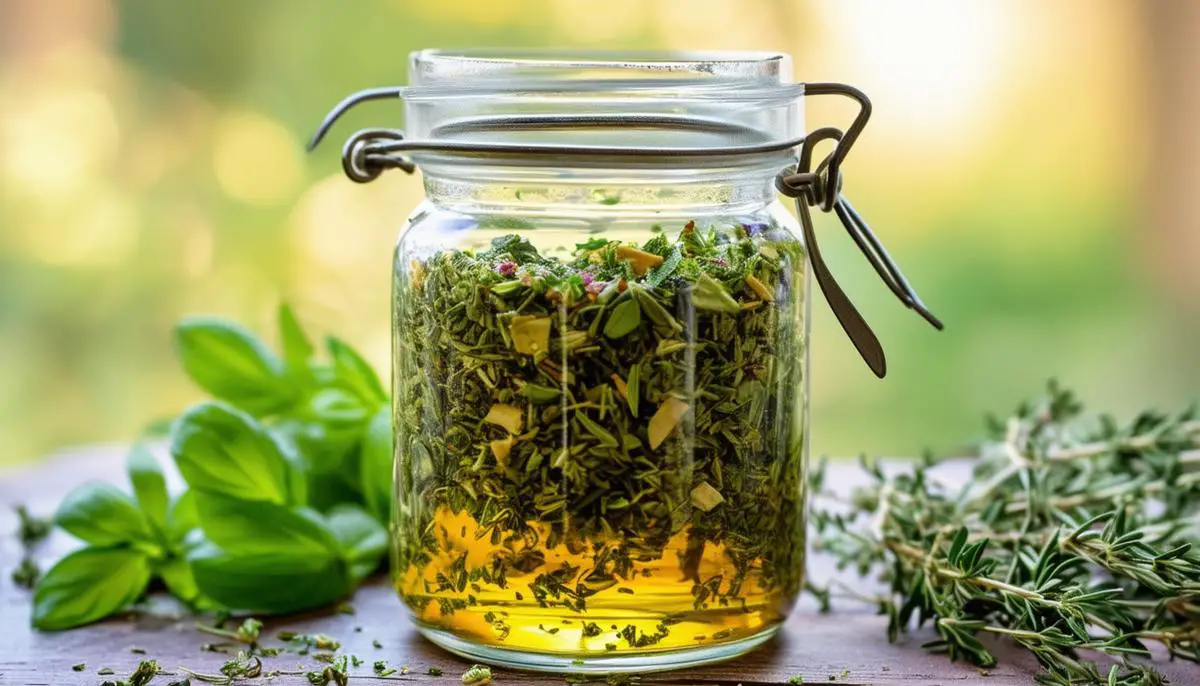
Health Benefits of Common Tinctures
Elderberry is renowned for its ability to support the immune system. This small, dark berry has been a staple in traditional medicine for centuries, with modern research highlighting its impressive properties. A study published in the Journal of International Medical Research in 2004 found that elderberry extract was effective in reducing the duration and severity of influenza symptoms.1 Elderberries are packed with antioxidants like flavonoids and vitamin C, which help boost immune function and combat oxidative stress. Anecdotal evidence suggests that elderberry tinctures, especially when taken at the onset of symptoms, can provide relief during the cold and flu season.
Echinacea is another powerhouse for immune support. Native to North America, this flowering plant has a long history of use by Indigenous peoples. Scientific studies, such as one published in Phytomedicine in 2015, have shown that echinacea can reduce the risk of catching a cold by up to 58%.2 It's believed to work by increasing the activity of white blood cells, which play a crucial role in fighting infections. While some studies have had mixed results, many people find that regular use of echinacea tinctures helps them ward off common illnesses.
Turmeric is well-celebrated not just in kitchens but also in apothecaries around the world. Its active compound, curcumin, holds potent anti-inflammatory and antioxidant properties. Studies, including a 2017 review in Journal of Medicinal Food, have shown curcumin to be effective in managing inflammatory conditions like osteoarthritis.3 Turmeric tinctures can help soothe joint pain, improve skin health, and support digestive health by reducing irritation in the gut.
Cannabis, particularly in the form of CBD (cannabidiol) tinctures, has garnered significant attention for its versatile health benefits. Unlike THC, CBD does not produce a "high" but offers numerous therapeutic effects. A 2018 review in Frontiers in Immunology highlights CBD's ability to reduce inflammation, alleviate anxiety, and manage chronic pain.4 It's becoming a go-to for those seeking natural remedies for stress relief without the psychoactive effects. CBD tinctures are being studied for their potential benefits in treating conditions like epilepsy and PTSD, providing hope for many.
Incorporating these tinctures into your wellness regimen can lead to an array of health benefits. However, it's essential to approach their use with an informed mindset. Always consult with a healthcare provider to ensure these herbal remedies align with your health needs and current medications.
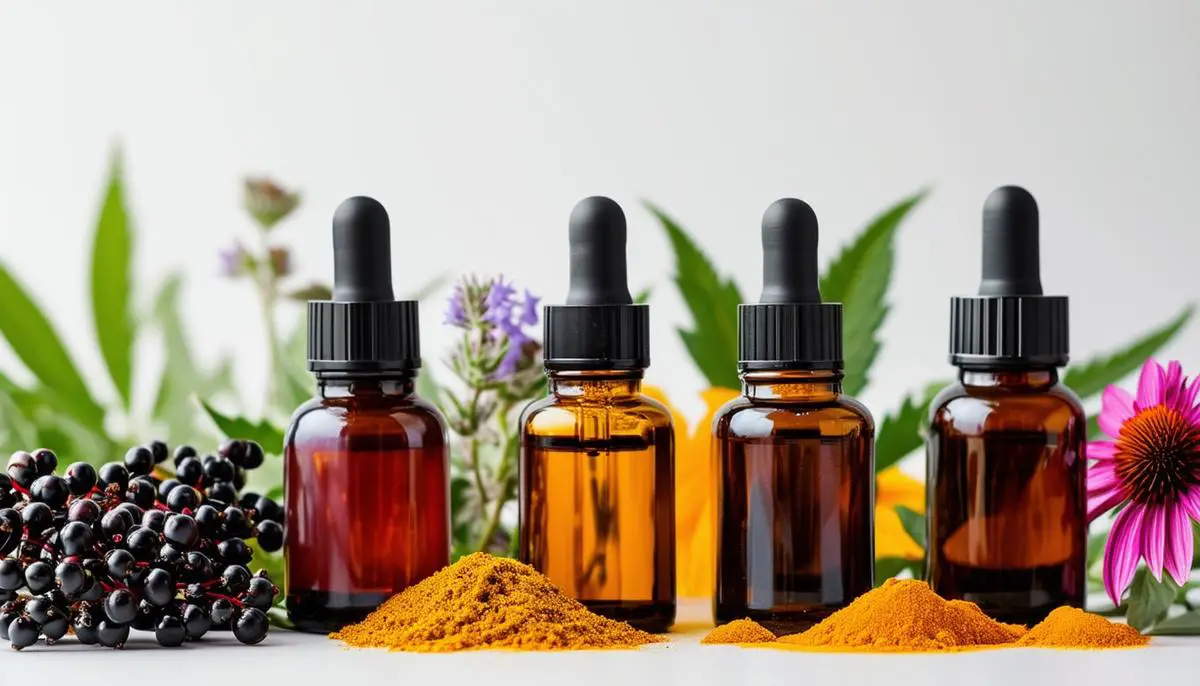
Risks and Safety Considerations
While herbal tinctures offer numerous health benefits, it's crucial to understand the potential risks and safety considerations associated with their use. Interactions with medications, allergic reactions, and toxicity can occur, so being informed is key to a safe and effective herbal regimen.
One of the primary considerations when using herbal tinctures is their interaction with medications. Some herbs can amplify or diminish the effectiveness of certain drugs, leading to unintended side effects. For example, St. John's wort, commonly used for its antidepressant properties, can interfere with medications like birth control pills, anticoagulants, and some cancer treatments. This interaction occurs because St. John's wort can speed up the liver's processing of these drugs, reducing their effectiveness. Milk thistle, often used for liver health, can also interact with medications metabolized by the liver, such as certain psychiatric drugs, statins, and blood thinners.
Allergic reactions are another potential risk when using herbal tinctures. Symptoms can range from mild to severe and may include:
- Fever
- Itchiness
- Hives
- Swelling
In rare cases, an herbal tincture can cause anaphylaxis, a life-threatening allergic response that requires immediate medical attention. Common allergens like chamomile, which is related to ragweed, can trigger such reactions in susceptible individuals. Always perform a patch test when trying a new herb and consult your healthcare provider if you have known allergies or have experienced allergic reactions in the past.
Toxicity is a significant concern, especially when dealing with potent herbs or incorrect dosages. Some plants contain toxic compounds that can harm the liver, kidneys, or other organs if ingested in large amounts. For instance, goldenseal is known for its anti-inflammatory and antimicrobial properties, but in high doses, it can cause severe digestive upset and liver toxicity. Similarly, gingko seeds are toxic and can cause seizures if consumed in large quantities. Ensuring you source tinctures from reputable suppliers and adhere to recommended dosages is critical.
When using tinctures, it's essential to follow a few safety guidelines:
- Start with a Low Dose: Begin with a small amount to see how your body reacts. Gradually increase the dosage as needed and as tolerated.
- Consult a Healthcare Provider: Always consult with a healthcare professional before starting any new herbal regimen, especially if you're pregnant, breastfeeding, or have existing health conditions. This step is vital for ensuring there are no potential interactions or adverse effects.
- Label and Store Properly: Proper labeling of your tincture bottles is crucial to avoid any mix-ups. Store them in a cool, dark place to maintain their efficacy.
- Be Aware of Contraindications: Certain conditions may be exacerbated by specific herbs. For example, people with autoimmune diseases should approach immune-stimulating herbs like echinacea with caution, as they could potentially worsen the condition.
- Watch for Side Effects: Monitor yourself for any adverse reactions, such as gastrointestinal upset, headaches, or changes in mood or energy levels. If you notice any adverse effects, discontinue use immediately and consult your healthcare provider.
Tinctures are a powerful way to harness the benefits of herbs. Approaching their use with knowledge and caution ensures a safer experience. With the right precautions, you can reap the rewards of nature's most potent offerings. Always prioritize safety and consult with healthcare professionals to make informed decisions about incorporating tinctures into your wellness path.
How to Make Herbal Tinctures at Home
Gather your materials. You'll need fresh or dried herbs, a high-proof alcohol like vodka (80-100 proof for most herbs or 180-proof for herbs with fewer water-soluble components), glass jars with tight-fitting lids, cheesecloth, and labels. The choice of herbs depends on the remedy you want to create. For instance, ginger root for combating nausea, or echinacea for immune support.
Wash your chosen herbs thoroughly to remove any dirt or contaminants. Once clean, coarsely chop them to increase the surface area for the solvent to work on. If you're using fresh herbs, aim for a 1:1 ratio of plant material to alcohol. For dried herbs, a 1:4 ratio is more effective due to the reduced moisture content.
Place the chopped herbs into your glass jar, filling it to about halfway if using fresh herbs, or a quarter full if using dried. Pour the alcohol over the herbs, ensuring they are completely submerged. This prevents mold growth and ensures all parts of the plant are exposed to the solvent.
Seal the jar tightly and store it in a cool, dark place. Shake the jar gently every few days to help the alcohol extract the active constituents from the plant material. Allow the mixture to sit for six to eight weeks. This period lets the alcohol fully draw out the beneficial compounds from the herbs.
After this extraction period, strain the mixture. Line a funnel with cheesecloth and place it over another clean glass jar. Pour the alcohol-herb mixture through the cheesecloth, squeezing the cloth to extract as much liquid as possible from the plant material. Discard the plant remnants.
Proper labeling is crucial. Write down the name of the herb, the part of the plant used, whether it's fresh or dried, the type of alcohol, the ratio used, and the date of creation. This information is essential for tracking potency and understanding the contents of your tinctures, particularly if you are creating multiple batches or different varieties. Store your labeled tinctures in dark glass bottles if possible, and keep them in a cool, dark place to maintain their efficacy and shelf life.
Safety and efficacy tips:
- Label Accurately: Always label your tinctures clearly with all relevant details. Mislabeling can lead to unintentional misuse or mixing up herbs.
- Store Correctly: Ensuring your tinctures are kept in a stable, cool, and dark environment extends their longevity—typically 5-6 years. Avoid exposure to heat and light, which can degrade the herbal compounds.
- Measure Mindfully: A standard dose is usually a few drops under the tongue or mixed with water. Start with a small amount to assess how your body reacts and adjust as needed, always staying within recommended dosages.
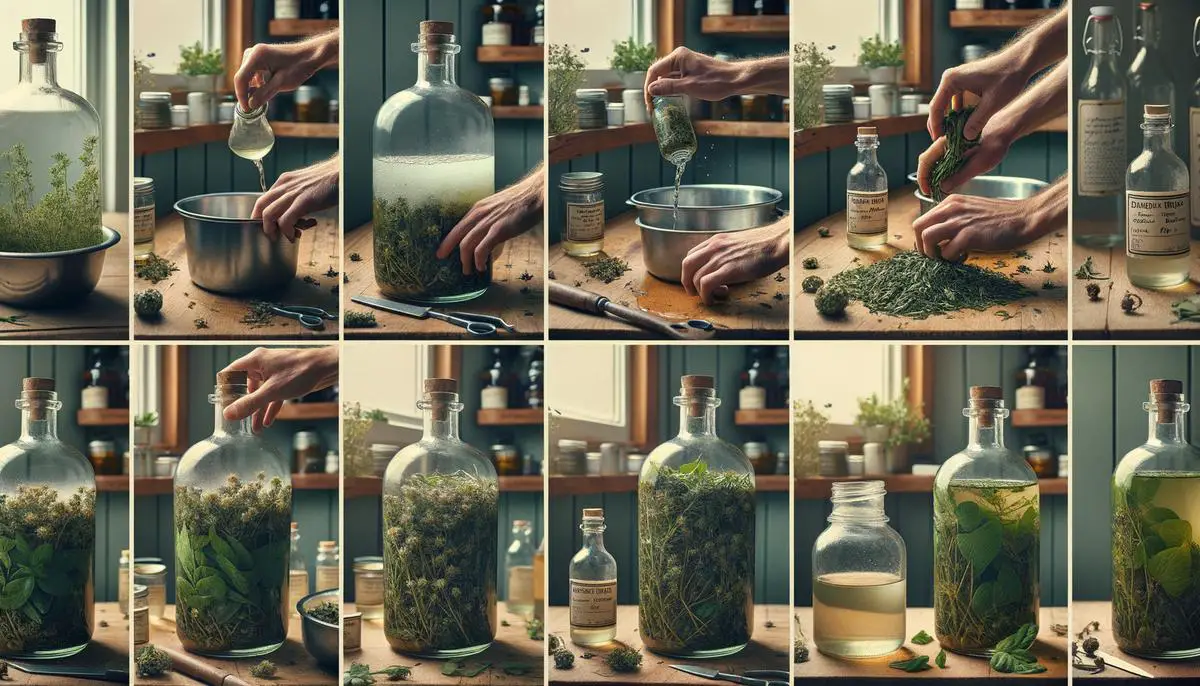
Popular Herbal Tinctures and Their Uses
Propolis tincture is derived from the resins collected by bees from the buds of poplar and cone-bearing trees. Historically, propolis has been used for its antibacterial, antiviral, and anti-inflammatory properties1. Traditional uses include treating wounds and infections, owing to its rich composition of flavonoids and phenolic acids. Propolis tinctures are particularly beneficial for oral health, showing efficacy in reducing dental plaque, treating canker sores, and even combating sore throats. A study in the Journal of Alternative and Complementary Medicine found propolis to be effective in treating mild to moderate periodontitis, highlighting its role in combating bacterial infections2. When considering propolis tinctures, always be mindful of potential allergic reactions, especially for those allergic to bee products.
Mugwort (Artemisia vulgaris) offers a rich array of health-promoting qualities. Traditionally, mugwort has been used in various cultures to support digestion, relieve menstrual cramps, and promote restful sleep3. It's also famed for its role in moxibustion, a traditional Chinese medicine practice that involves burning mugwort on or near the skin to stimulate healing. Mugwort's benefits can be attributed to its active compounds, including artemisinin, which has mild uterine-stimulating effects, and antioxidants like camphor and cineole. Mugwort's potential for supporting digestive health and easing anxiety has been noted in various folk medicine practices, though more rigorous studies are needed. For dream enthusiasts, mugwort is known to enhance vivid dreams and support lucid dreaming. Always check local regulations before cultivating mugwort, as it can be invasive and may carry legal restrictions.
Olive leaf extract, derived from the leaves of the olive tree (Olea europaea), offers a powerhouse of health benefits that extend beyond its more famous counterpart, olive oil. Olive leaves have been cherished since ancient times for their medicinal properties. The primary active compound, oleuropein, is a potent antioxidant with anti-inflammatory, antimicrobial, and cardiovascular benefits4. Studies, such as one published in the Journal of Nutritional Biochemistry, have highlighted olive leaf extract's role in lowering blood pressure and improving heart health by reducing oxidative stress5. Additionally, hydroxytyrosol, another key component, promotes cardiovascular wellness and has been studied for its neuroprotective properties. The liver-boosting and immune-supporting properties of olive leaf extract make it a valuable addition to any health regimen. When incorporating these tinctures, it's crucial to follow dosing recommendations and consult with a healthcare professional to ensure there are no contraindications with your current health conditions or medications.
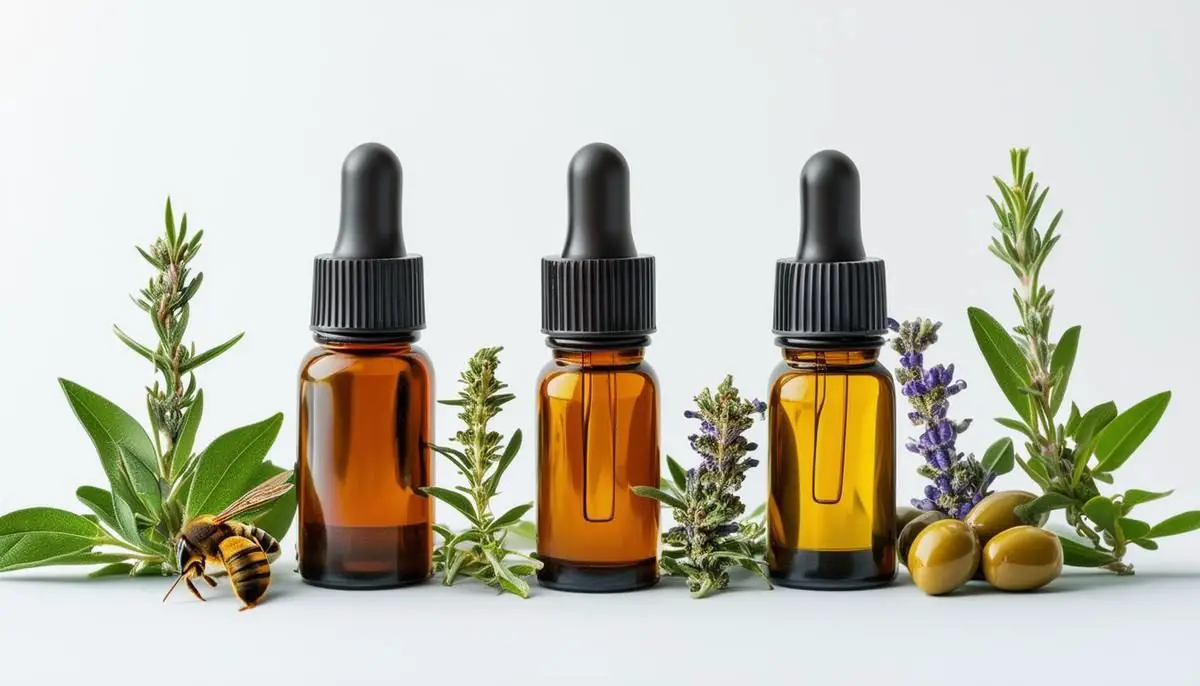
Incorporating herbal tinctures into your daily life can open up a world of natural health benefits. From boosting immunity to easing anxiety, these extracts offer a potent and effective way to enhance your well-being. Always approach their use with care and consult healthcare professionals to make informed decisions. With the right knowledge and precautions, you can confidently embrace the benefits of herbal tinctures on your journey to better health.



